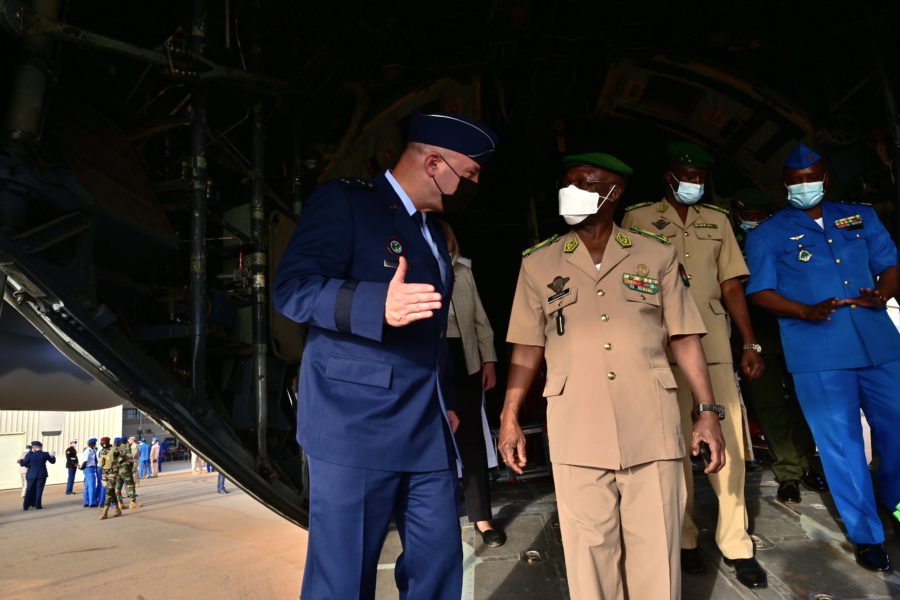Service members working to fight terrorist groups expanding in Africa have their hands tied by restrictions on security cooperation with military-led countries, giving China and Russia an edge, Deputy Assistant Secretary of Defense for Africa Chidi Blyden told senators July 12.
The restive Sahel region of Africa consists of five vast, sub-Saharan nations plagued by terrorist groups that have helped unseat democracies and welcomed America’s strategic competitors. Three of the five nations—Mali, Burkina Faso, and Chad—have undergone coups in the past two years. The coups trigger a State Department restriction on security cooperation and leave the Defense Department with just one main partner in the region, Niger, which is home to the heavily fortified Air Base 101 and Air Base 201, which are used for intelligence, surveillance, and reconnaissance of terrorist groups.
“Russia and the [People’s Republic of China] routinely provide training and defense articles to African nations,” Blyden told a Senate Foreign Relations Committee hearing on insecurity in the Sahel.
“While our African partners have stated repeatedly that they prefer our training and defense articles, they turn to our competitors when we are not responsive to their requests,” she added. “Ending our U.S. security cooperation has affected our bilateral engagement.”
Blyden called for finding a way to continue engaging with the Sahel nations so that access and influence are not lost to America’s competitors, but senators sought to further restrict opportunities for cooperation.
Senate Foreign Relations Committee chair Sen. Bob Menendez (D-N.J.) urged the State Department to impose travel sanctions on foreign government officials who were involved in the coups. Sen. Chris Van Hollen (D-Md.), meanwhile, introduced legislation to further expand the vetting of foreign military officers before they are allowed to participate in U.S. training programs.
Robert Jenkins, assistant administrator of the Bureau for Conflict Prevention and Stabilization at the U.S. Agency for International Development, painted a picture of what a loss of American influence looks like in the Sahel.
“It’s a region where we’ve seen young people dancing in support of military takeovers, waving Russian flags, and repeating the disinformation that targets them relentlessly,” he said, describing scenes from Mali’s May 17, 2022, coup.
The suspension of U.S. assistance to Mali, coupled with the withdrawal of French counter-terrorist forces, led Mali’s ruling junta to invite the Russian mercenary Wagner Group, implicated in many civilian deaths in Ukraine, to help provide security.
Blyden said DOD is working closely with France on the withdrawal of its 2,400 troops to Niger, where the U.S. maintains some 800 troops conducting ISR on terrorist groups; building partner capacity; and working to counter China and Russia’s influence.
The shrinking U.S. and French foothold in the Sahel means the United States may start to reposition forces in other African countries, especially littoral states that are now threatened by the expansion of terrorist groups.
“Our operations and the support that we provide will continue in a way, but it will be spread more widely,” said Blyden.
“We see the spread moving towards the coastal West Africa countries,” she said, referring to the more prosperous nations on Africa’s west coast. “We’re seeing an opportunity with the French repositioning to really rethink where it is that we might need bolstering of African partners to be able to continue to counter the violent extremist threat.”
Mauritania is one nation that straddles both the Sahel and littoral regions that may benefit from a deeper partnership, the defense official said.
Blyden said that despite the restriction on security cooperation, the 2022 National Defense Authorization Act authorizes money to counter Russia and China on the continent, and DOD is looking at programs to counter China and the Wagner Group’s influence.
“We have to recognize that there is a great powers competition going on,” said Sen. Mike Rounds (R-S.D.), calling on DOD to find ways to do more. “Russia and China are both very actively engaged on the African continent, and they are also very actively engaged within the Sahel.”
U.S. Air Forces Africa and U.S. Africa Command did not respond to requests by Air Force Magazine for comment. The Pentagon did not immediately provide further details on the security threat and challenges faced.
The Senate Armed Services Committee will host a confirmation hearing July 21 for Marine Corps Lt. Gen. Michael Langley for promotion to general and to be commander of U.S. Africa Command, the senior military official responsible for engaging with nations in the region.
